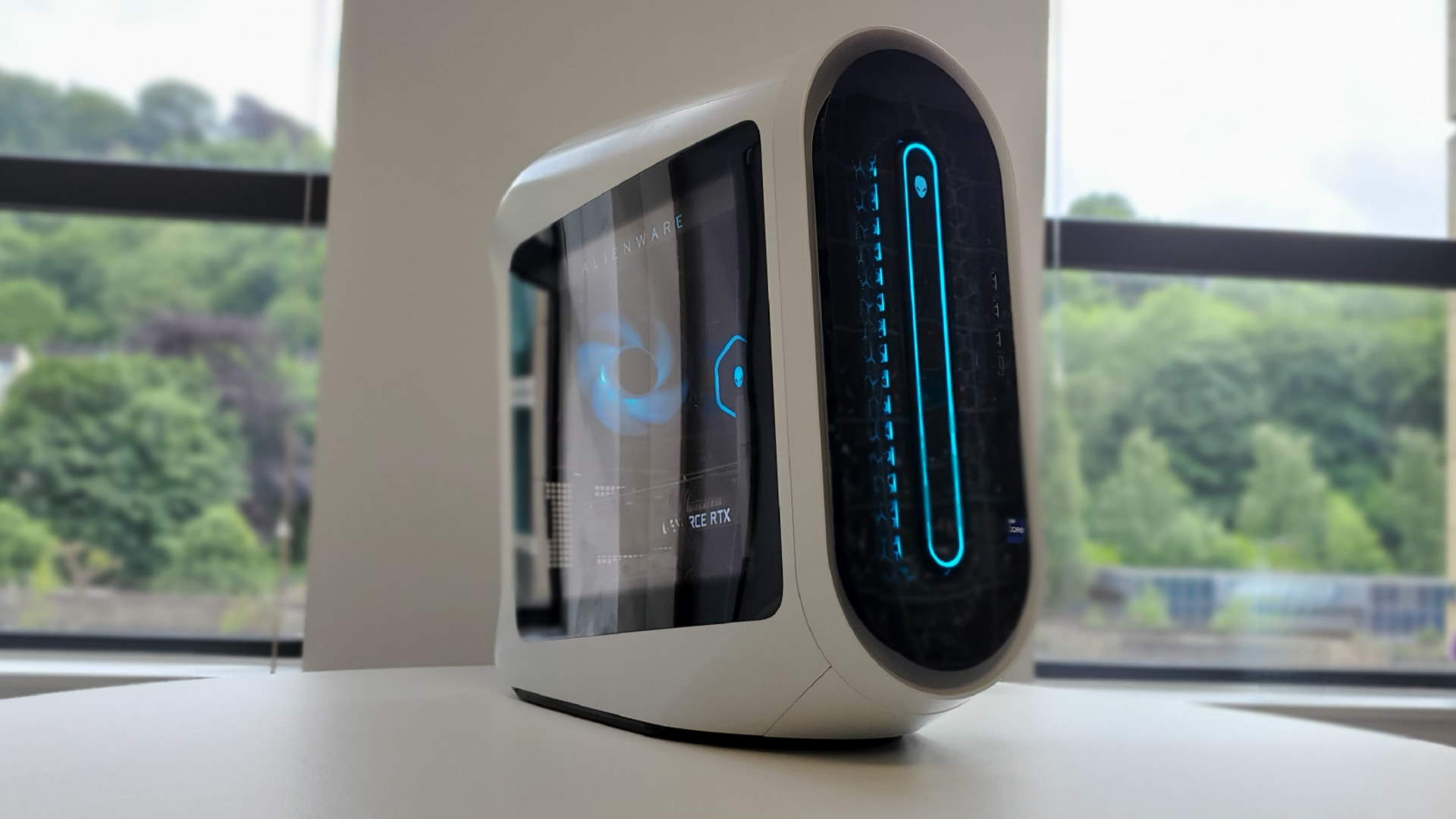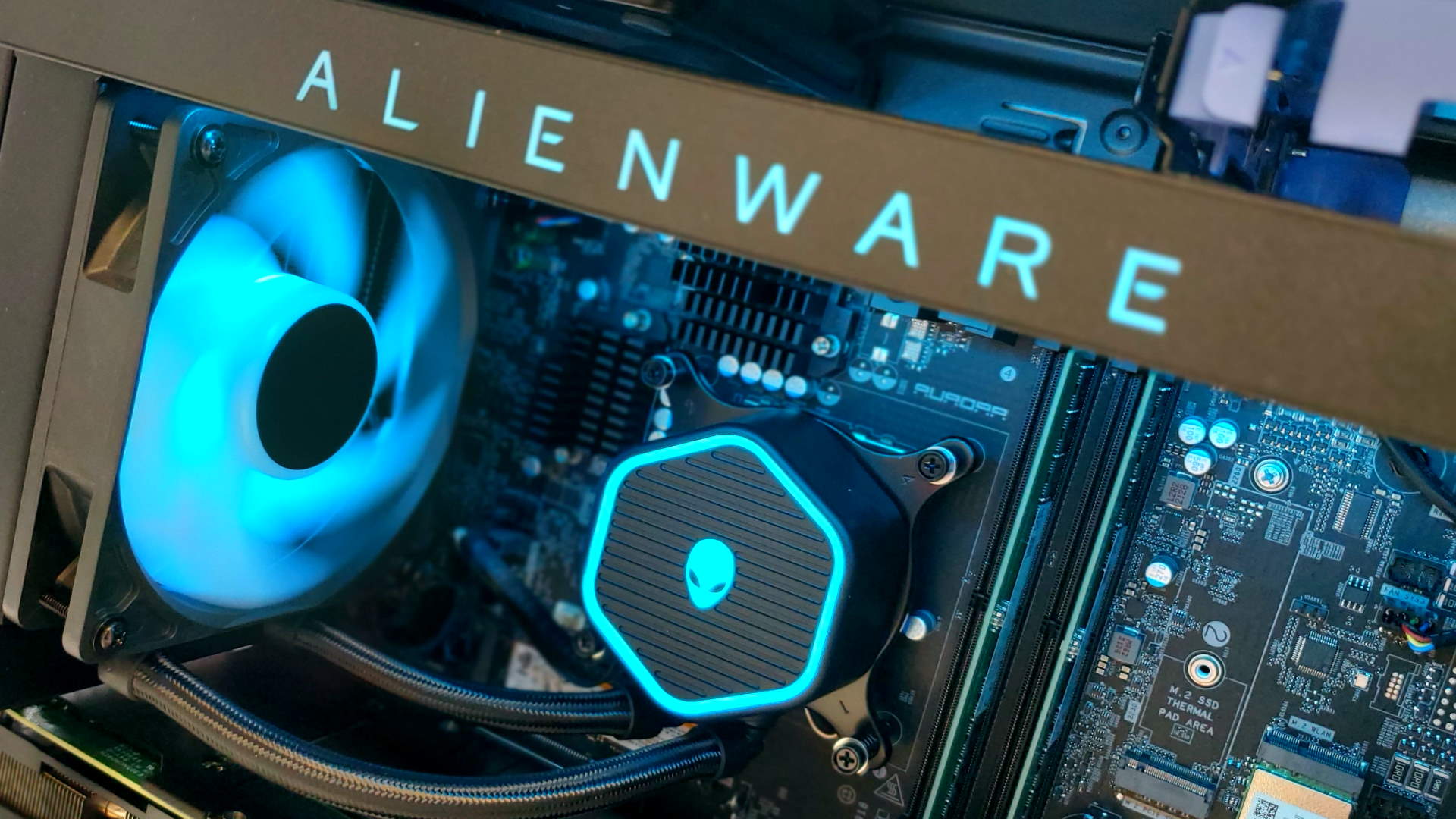Our Verdict
The Alienware Aurora R13 isn't for everyone, and this 64GB spec probably isn't for anyone. If you're a dedicated PC tweaker looking for a new base system to upgrade down the line, you'd want to look elsewhere anyways. But if you just want a simple, good-looking PC that will tear through gaming frame rates out of the box, the Aurora R13 comes with far better-value specs lists than this.
For
- Like the new chassis design
- Easy access for some upgrades
- Stellar gaming performance
Against
- Too many bespoke components
- Gamers don't need 64GB DDR5
- CPU throttles
- Can get bizarrely loud
- Odd BIOS
PC Gamer's got your back
Alienware PCs have always had a certain allure. They were the first desktops individually styled to be entities unto themselves and there was a time in the long, long ago when if you wanted a 'gaming PC' that really meant you wanted an Alienware PC. You just probably couldn't afford it.
Everything else was just a beige box that might have had a graphics card inside it.
But now gaming PCs come in infinite styles and colours, are sold by a broad swathe of retailers, and Alienware is now only a brand living in serfdom on the Dell homeworld. Yet, despite its corporate overlords, Alienware machines retain some of their former mystique, and also come with Dell levels of support and even bespoke hardware. Though that latter is not to everyone's benefit.
This Alienware Aurora R13 is the latest Intel-powered version of the company's main desktop gaming system, finally featuring an updated Aurora chassis. For a company which pioneered the gaming PC I find it strange it's taken so long to jump onboard with the peep-through side panel idea, but finally you too can gaze adoringly at the insides of your xenomorphic rig like everyone else.
The previous case was also surprisingly big, and it's a welcome sight to see the new Aurora not dominating your desktop like the previous smooth white thing did. It still retains those pleasing curves, making it tough to balance anything atop your rig for good or ill. And there's still a definite Heart of Gold aesthetic to the chassis design, contoured as it is in excitingly chunky shapes.
The case isn't the only non-standard thing about the Alienware Aurora R13, however; there are a lot of internal components that sit outside the norms of PC gaming convention. For one, the Z590 chipset-wielding motherboard is unlike any you'll find coming from the likes of Asus, MSI, or Gigabyte. It's a bespoke design that fills out the chassis and conforms to no ATX/micro-ATX standard I can see.
It's also pretty lightweight on the VRM and attached heatsink front, too. Which would have me concerned over how it's going to deal with something so power-hungry as the Intel Core i9 12900KF that Alienware has packed into this $3,400 machine. And don't get me started about the BIOS that sits on the board; it's like the last 15 years never happened.
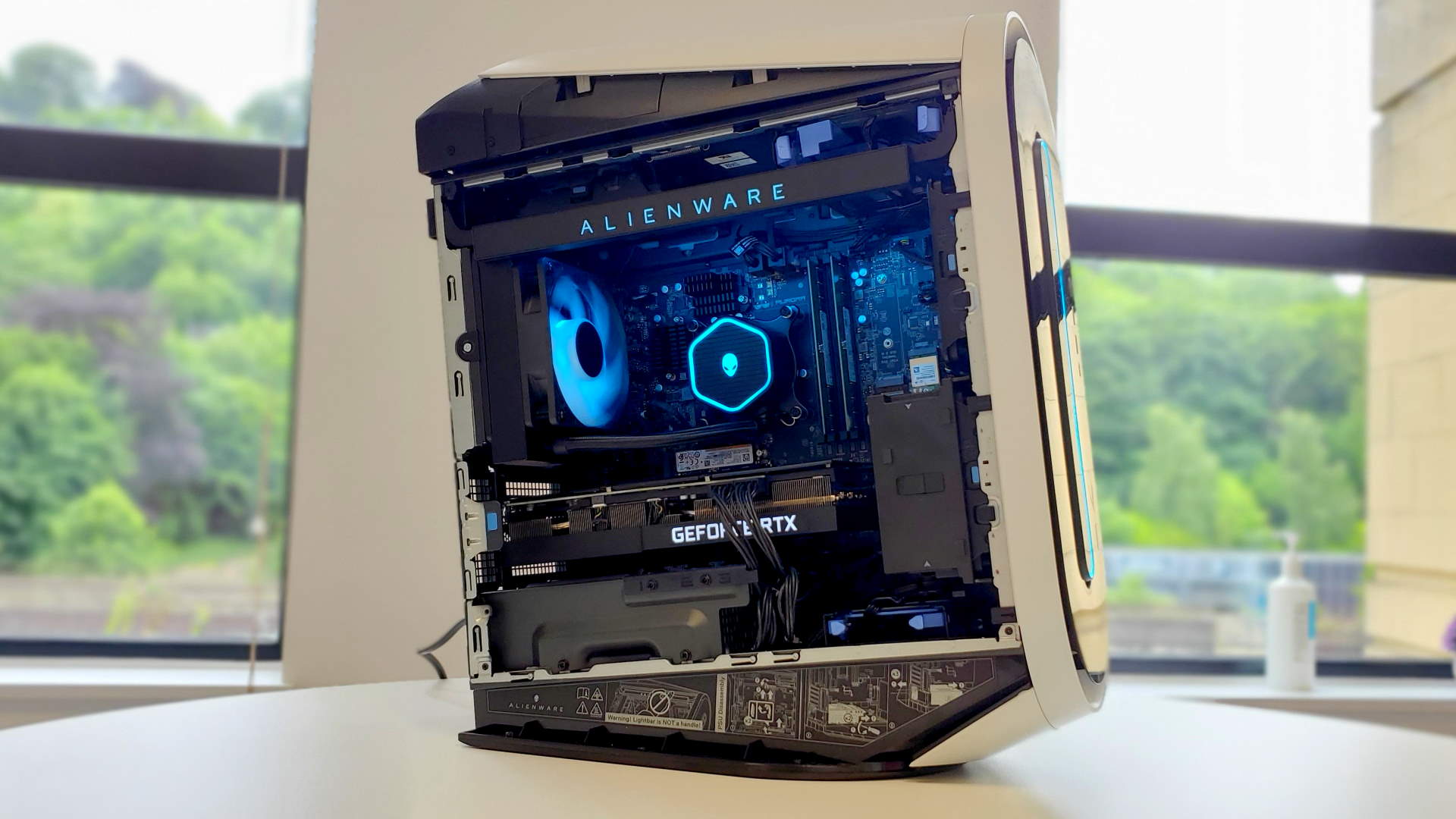
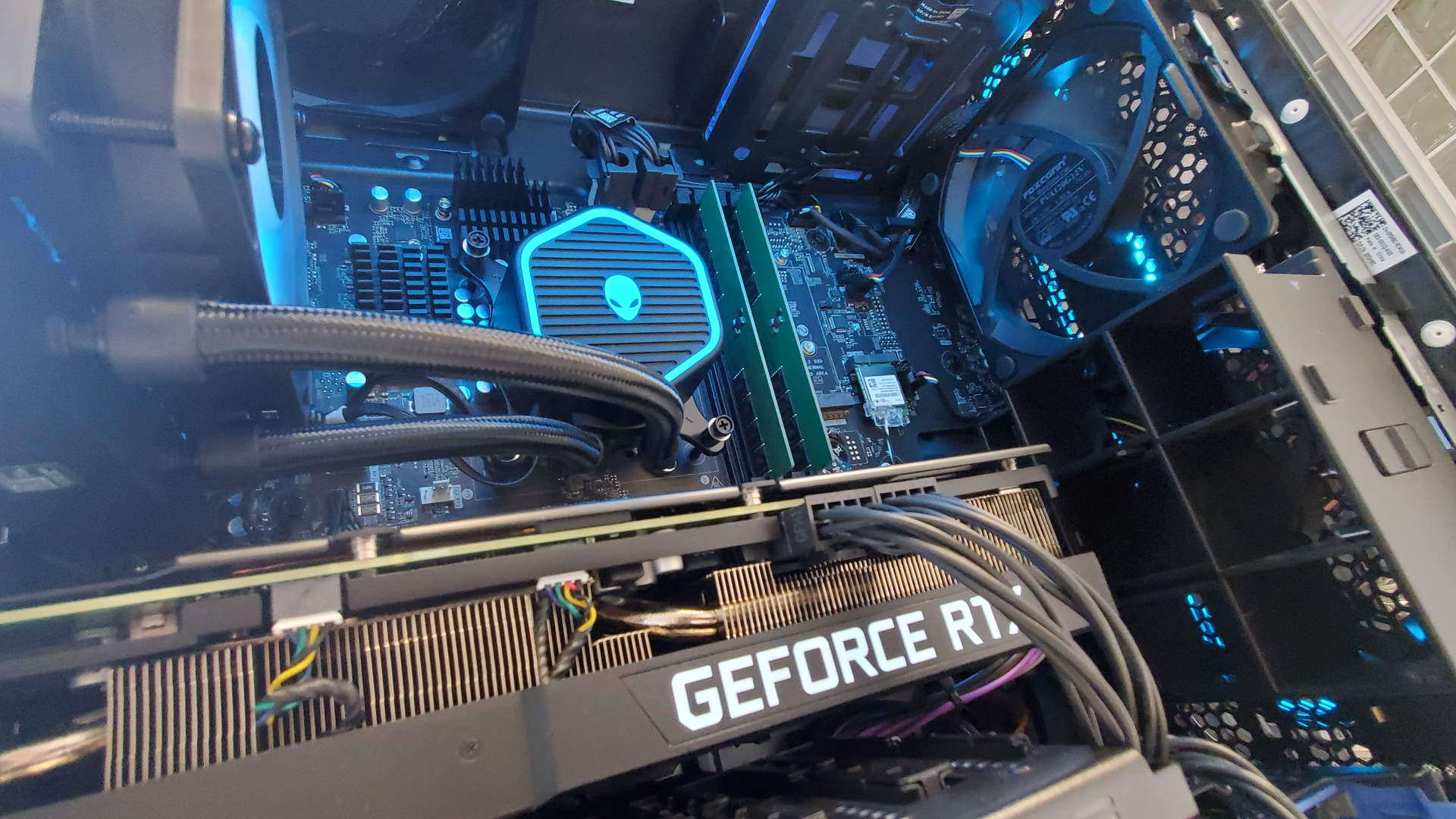
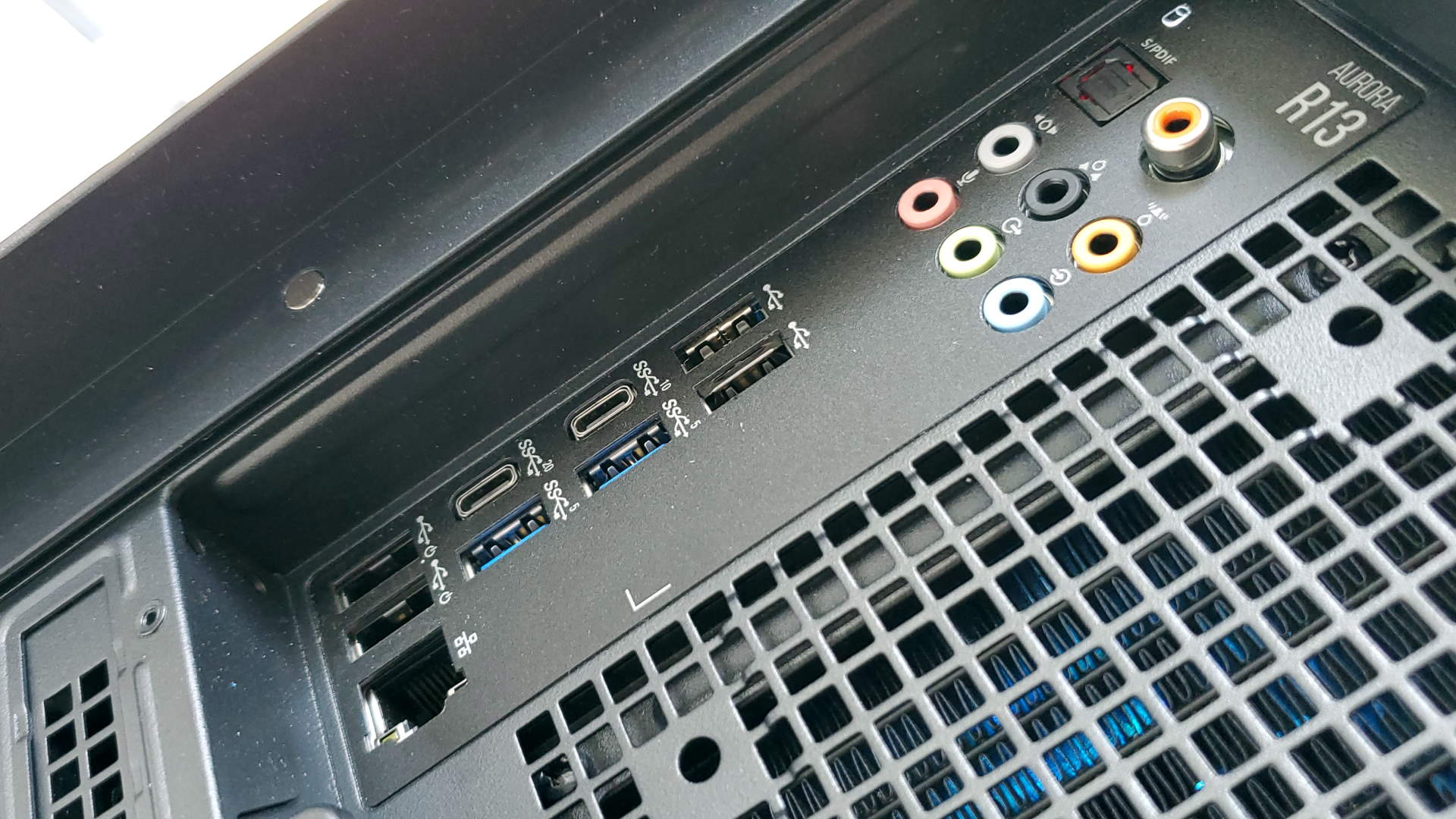
I mean, it does work, and has all the standard settings you need should you go digging around in there, and there are even overclocking settings for the chip should you so wish (I wouldn't, our CPU was throttling even at stock settings). But the fact that it's referring to the Alder Lake Efficient Cores as just plain Atom Cores has me thinking not a lot has been done to update the baked-in software since it saw its first engineering sample from Intel.
The memory also looks a bit suspicious in there with its bare green PCB, especially when we've been used to DDR5 modules sporting funky heatspreaders and RGB'd to within an inch of their glitzy lives. Looking at you G.Skill. There's no XMP to speak of, but there is 64GB of DDR5 running a 4,390MHz, and it pays off on the bandwidth front.
The GeForce RTX 3080 looks pretty generic, too, though it does at least have a pretty hefty heatsink and dual-fan configuration. And it works, posting some decent thermal performance under full gaming load.
It is still strange that you're getting the same sort of old-school Dell/Alienware bare metal chassis insides, generic motherboard, bare RAM, and basic GPU you'd get with the closed case design, but now fully on display. It's a little jarring in light of some of the stunning looking internals you'll find from more boutique system builders.
Elsewhere you do get a full 1TB of storage in the guise of the Samsung OEM-focused PM9A1 SSD. It's a proper PCIe 4.0 drive, however, with rated sequential read/write performance measured at 7,000MB/s and 5,100MB/s respectively. And that raw speed is borne out by our game testing, with the Aurora R13 actually posting the quickest FFXIV level loads we've seen in a pre-built system.
And the gaming performance is pretty damned impressive, too. All the trepidation I felt because of strangely non-standard internals—which somewhere don't fit with what has become the high-end PC gaming standard—has kind of evaporated now I'm gaming on it. The performance across the board is pretty damned impressive, besting other, pricier systems we've loved and PCs with GPUs that ought to roast it.
1440p gaming performance
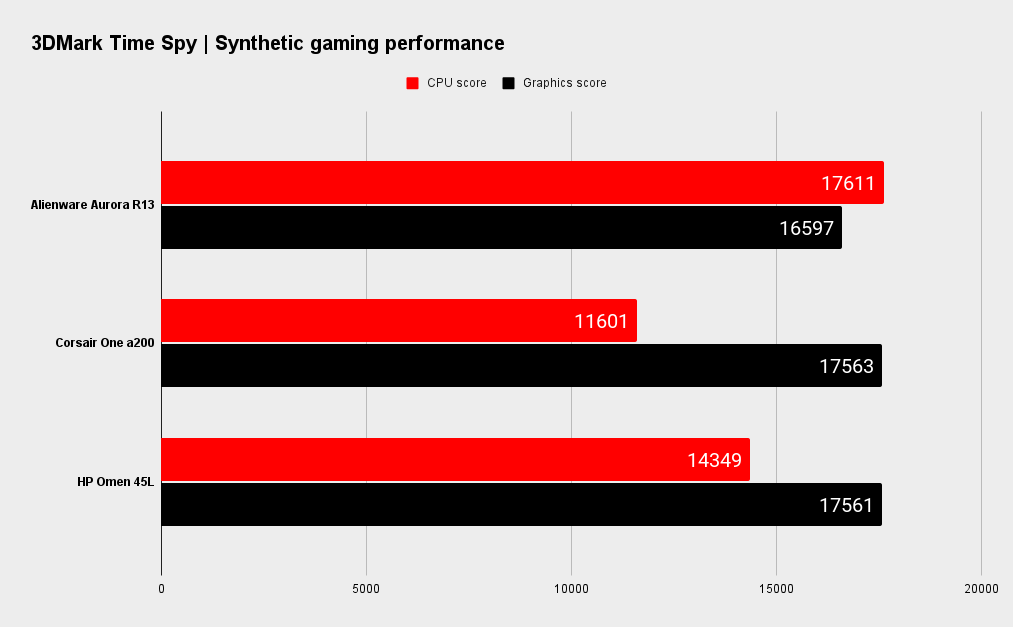
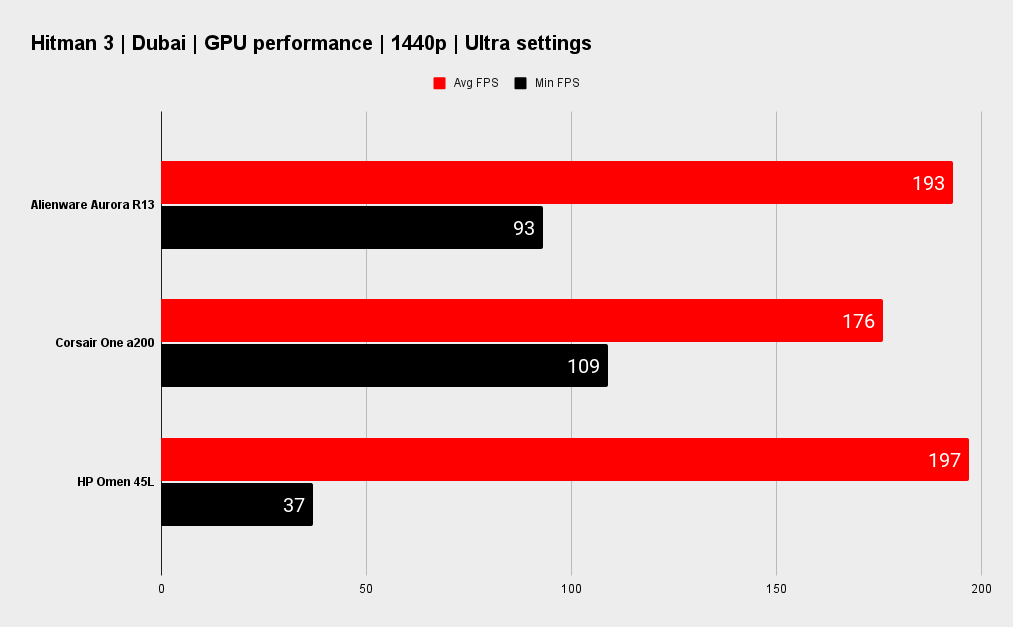
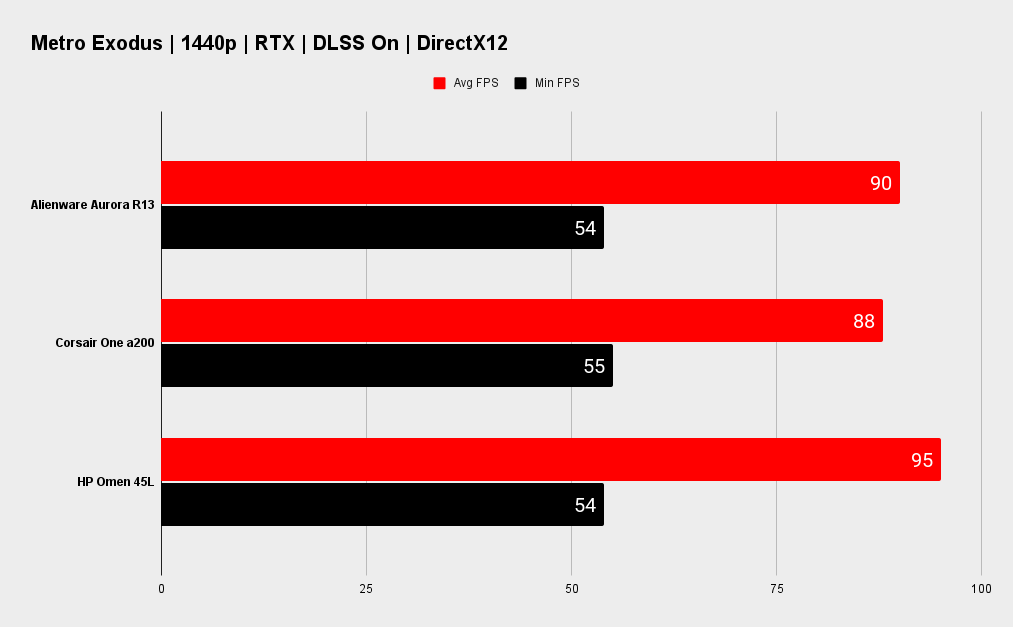
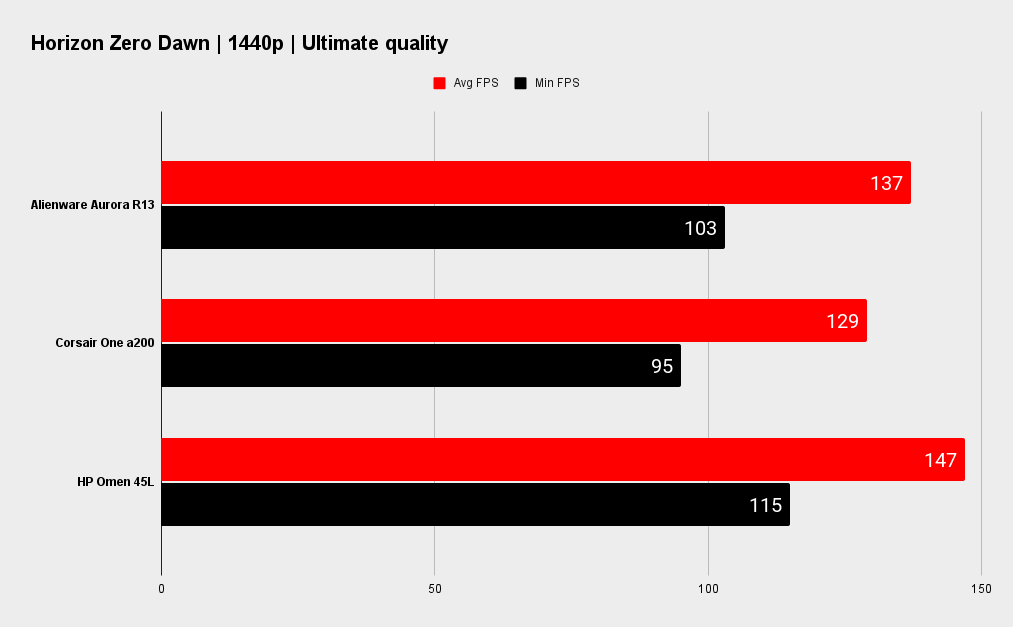
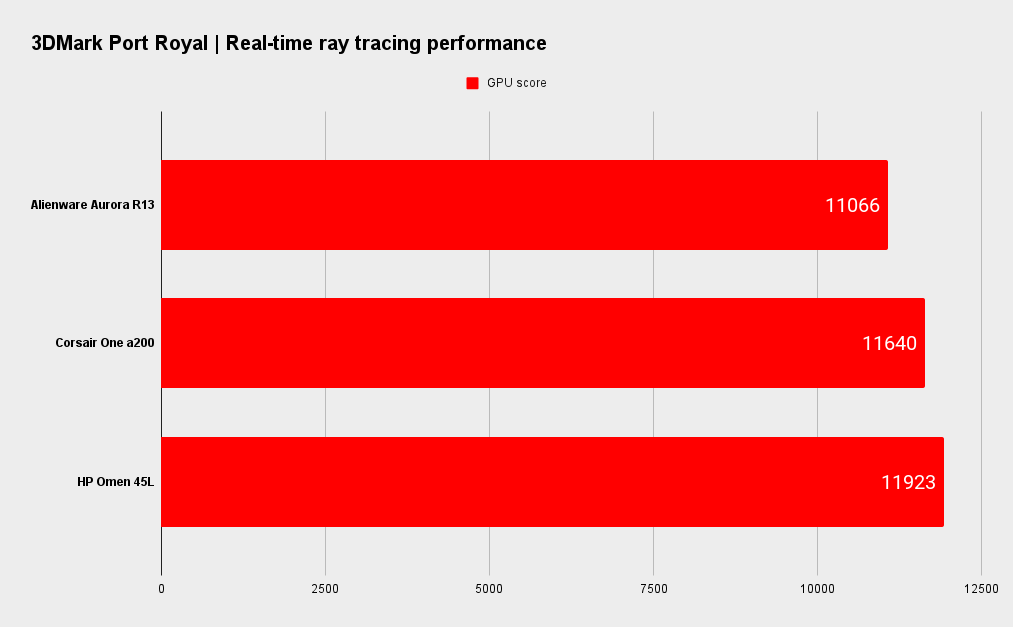
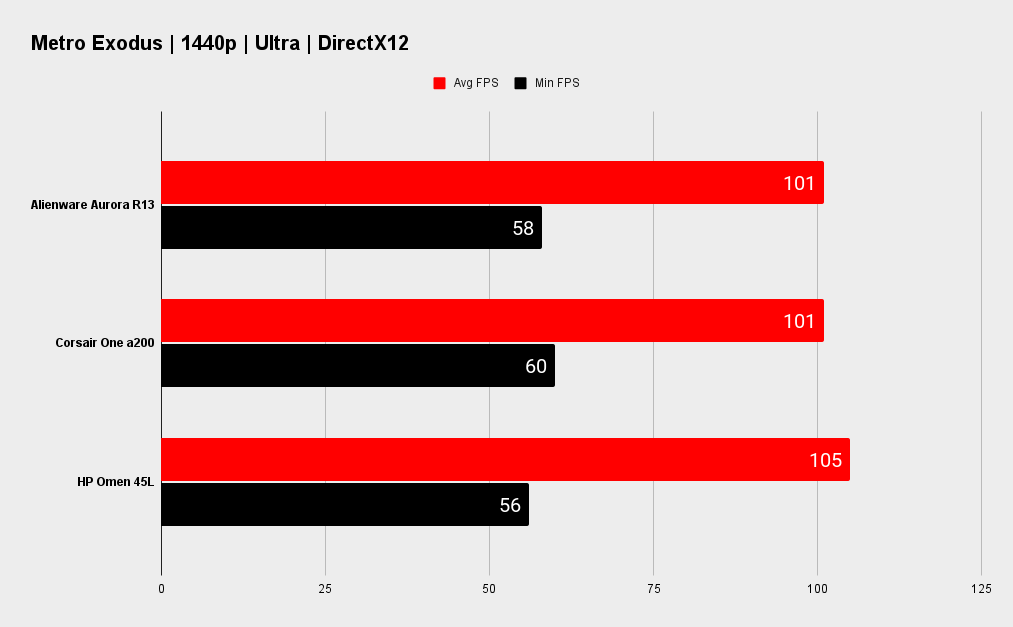
4K gaming performance
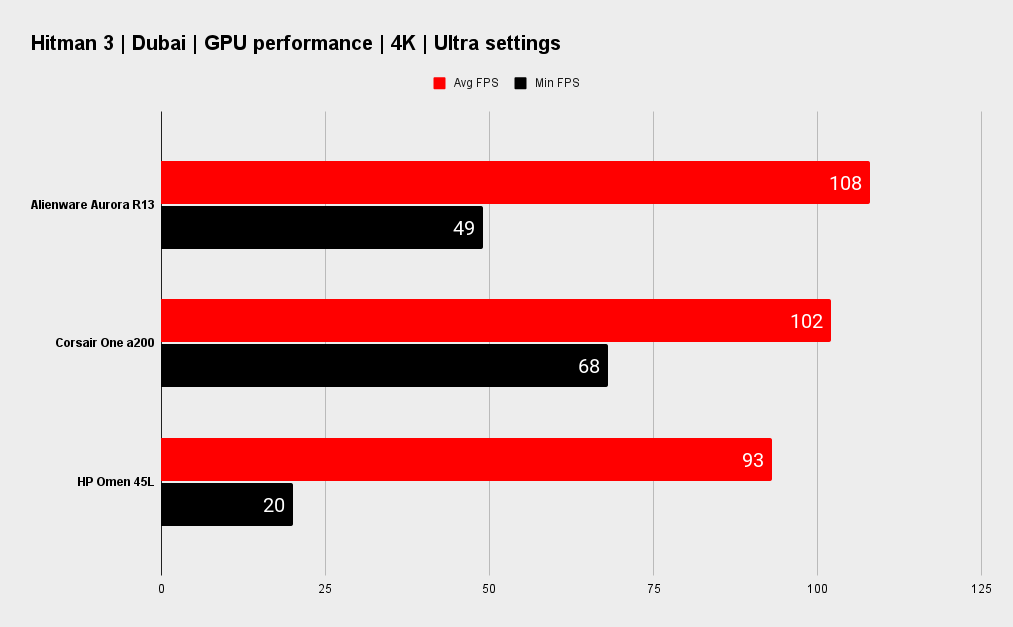
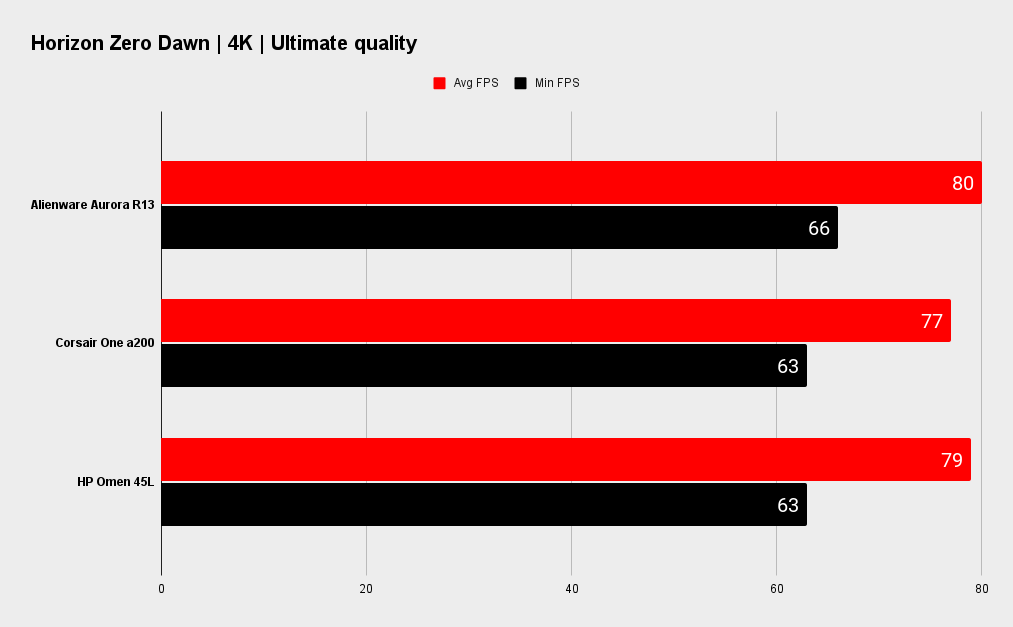
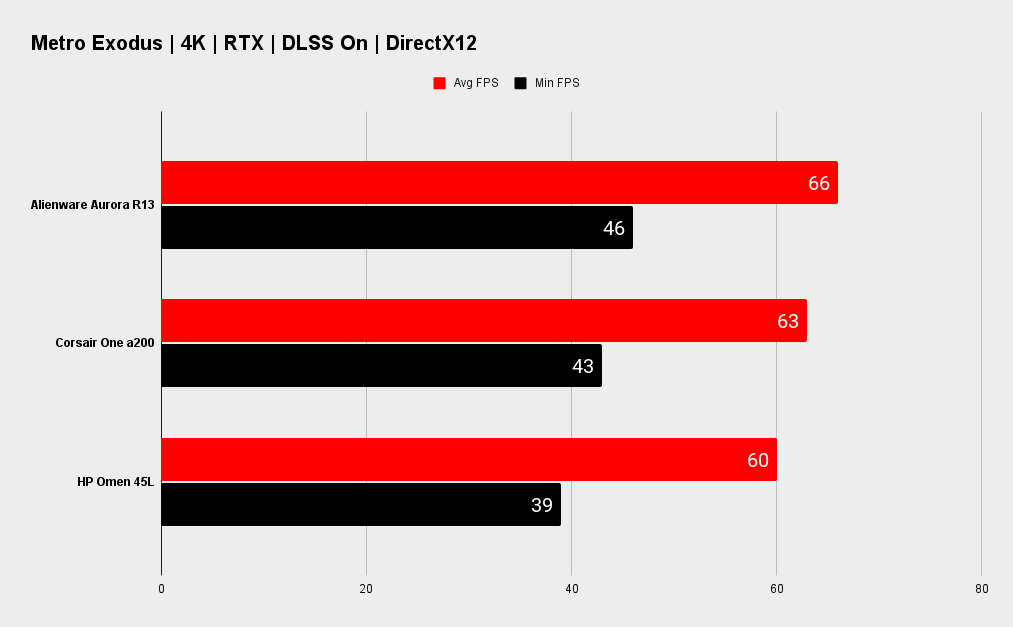
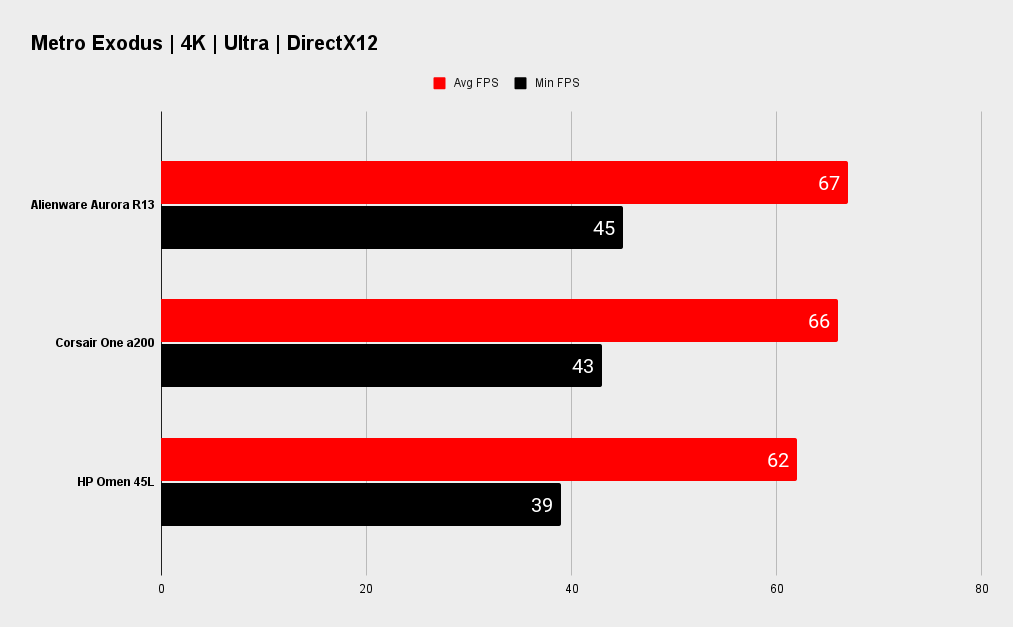
System performance
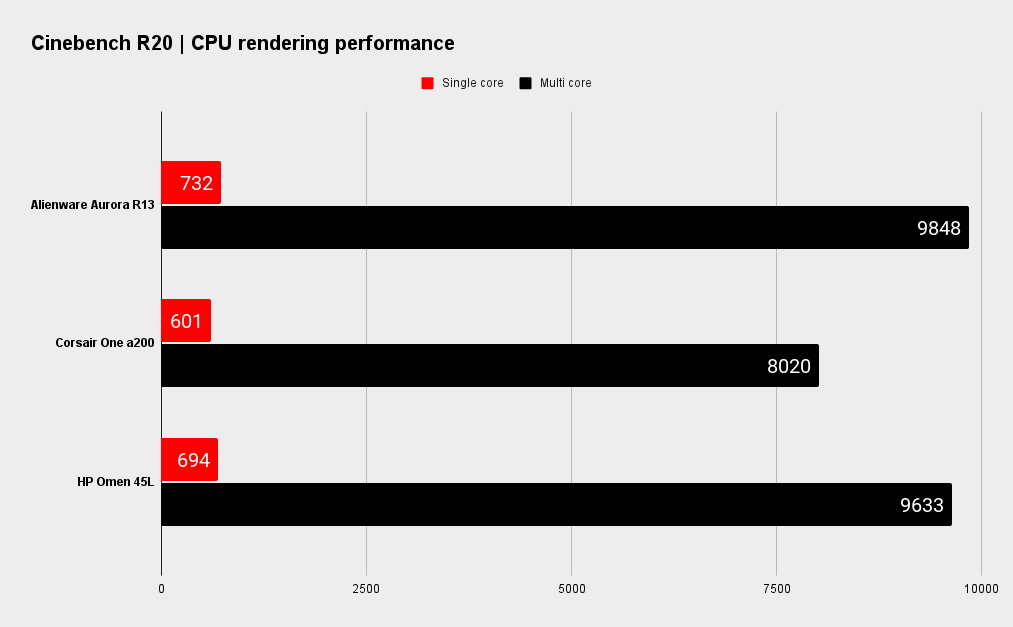
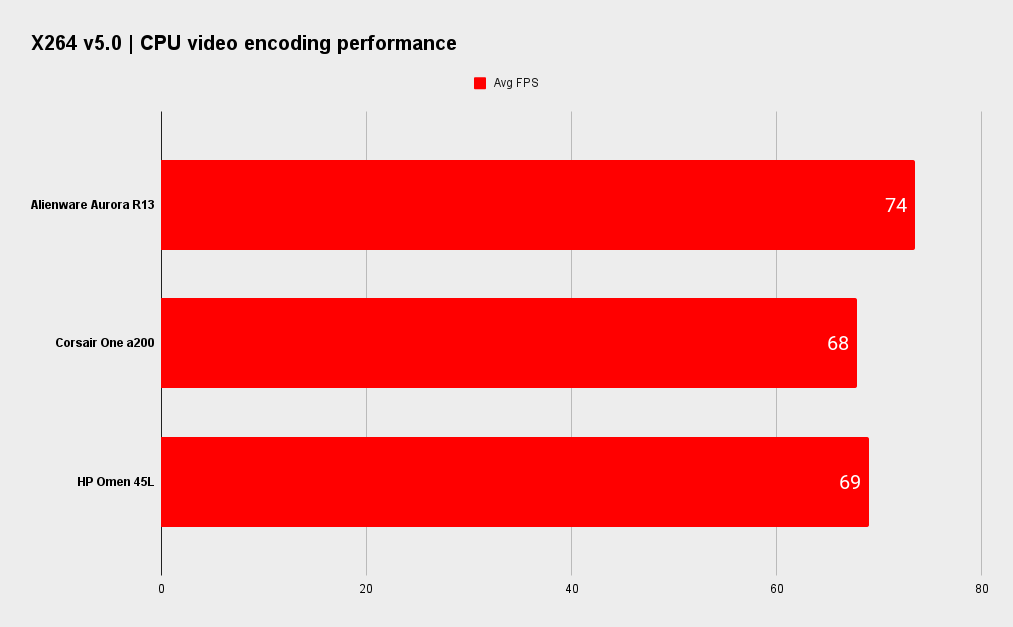
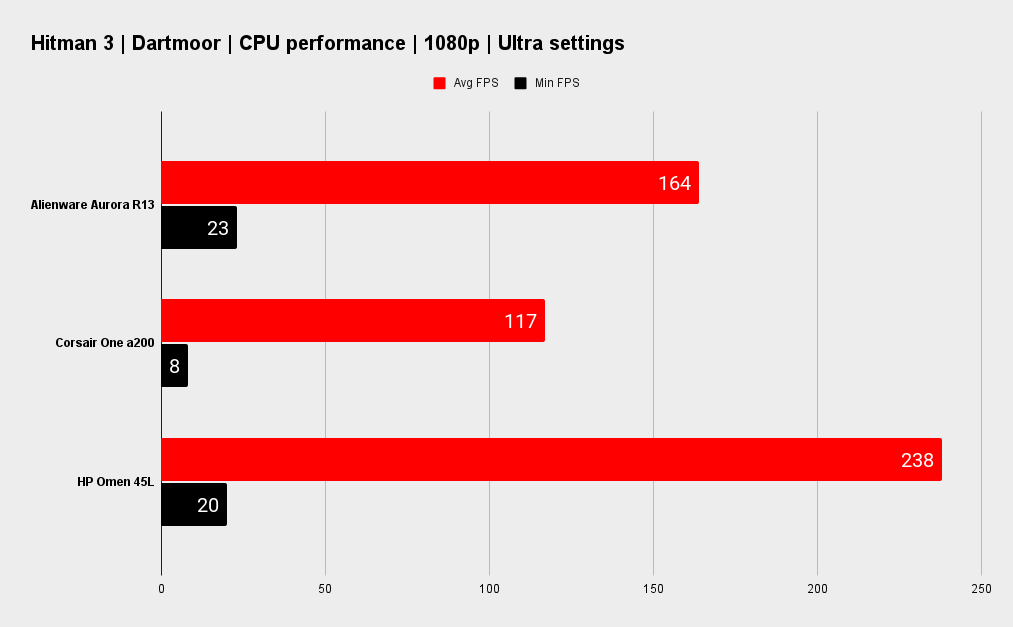
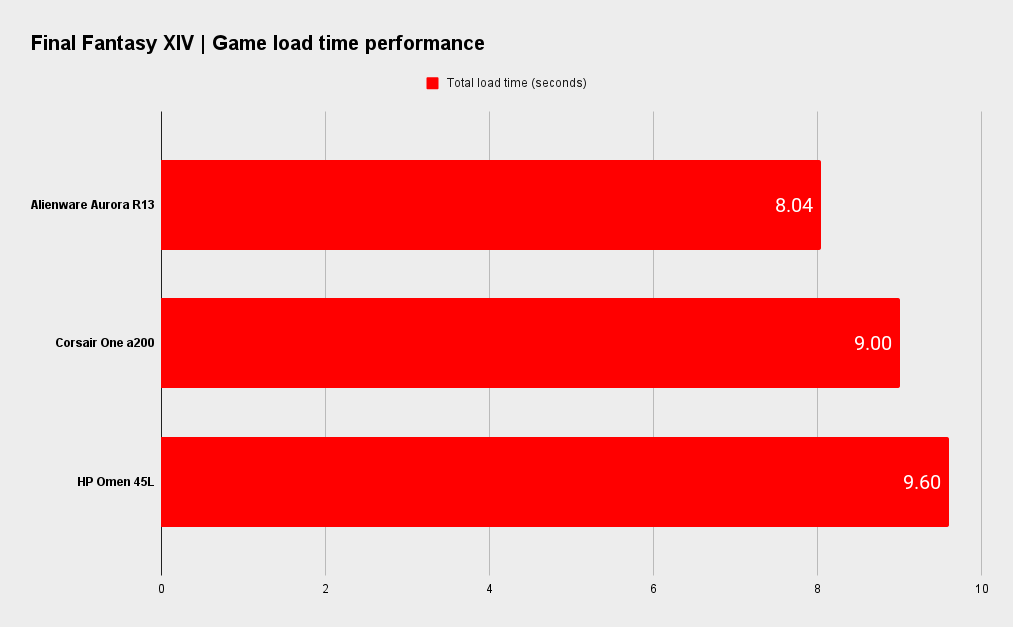
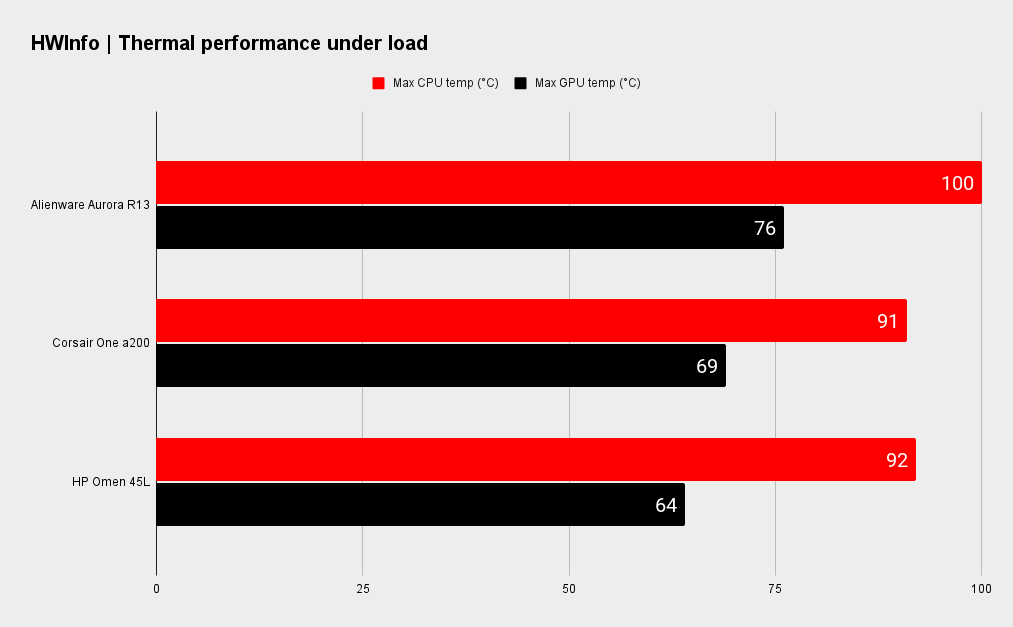
Honestly, I wasn't really expecting that. We've had some great experiences with Alienware machines, but we've also had times where the non-standard tech has seriously held them back and had us questioning just why they didn't perform. Seeing the CPU hitting a 100°C peak and throttling in our video encoding test had me thinking maybe the Aurora R13 might suffer in the final reckoning, too.
But it ain't so.
Up against the Ryzen 9 5900X-powered Corsair One a200, also with an RTX 3080 inside it, and against the HP Omen 45L with the top Alder Lake CPU and an RTX 3090, the Aurora R13 holds its own.
I'm impressed that at 1440p it delivers the same sort of gaming performance as the RTX 3090-powered Omen, trailing by only a few fps at most. It's quicker than the ultra-compact Corsair One, though that would be expected given the different size of chassis and the propensity to perform at higher speeds with superior cooling. The curious thing is the RTX 3080 actually runs hotter in the Aurora than the confined version inside Corsair's diminutive chassis, yet still delivers higher frame rates.
It feels like the Corsair One is holding back its GPU to keep its temps down, while the Alienware is just letting it go. The issue with that is the cooling inside the Aurora can have a tendency to go buck wild. Sometimes, for seemingly no good reason, the fans will just spin up to turbine proportions to chill things out. Other times, it can be thrashing away under full load and you'll barely notice it.
But I'm super surprised by 4K gaming performance that has the Aurora machine pulling ahead of the Omen system. This is a system that's comfortably cheaper than either of the other two—something we rarely get to say about an Alienware rig—and I wouldn't have expected it to consistently outperform them straight out of the box.
And that plays into the ethos of Alienware systems; they're almost as console-like as gaming PCs get. They're for folk who want to buy into a PC brand but who don't necessarily want to have to deal with the standard PC gaming setup woes that can beset a new system. And those people want their rigs to smash it out of the box, which this system absolutely does.
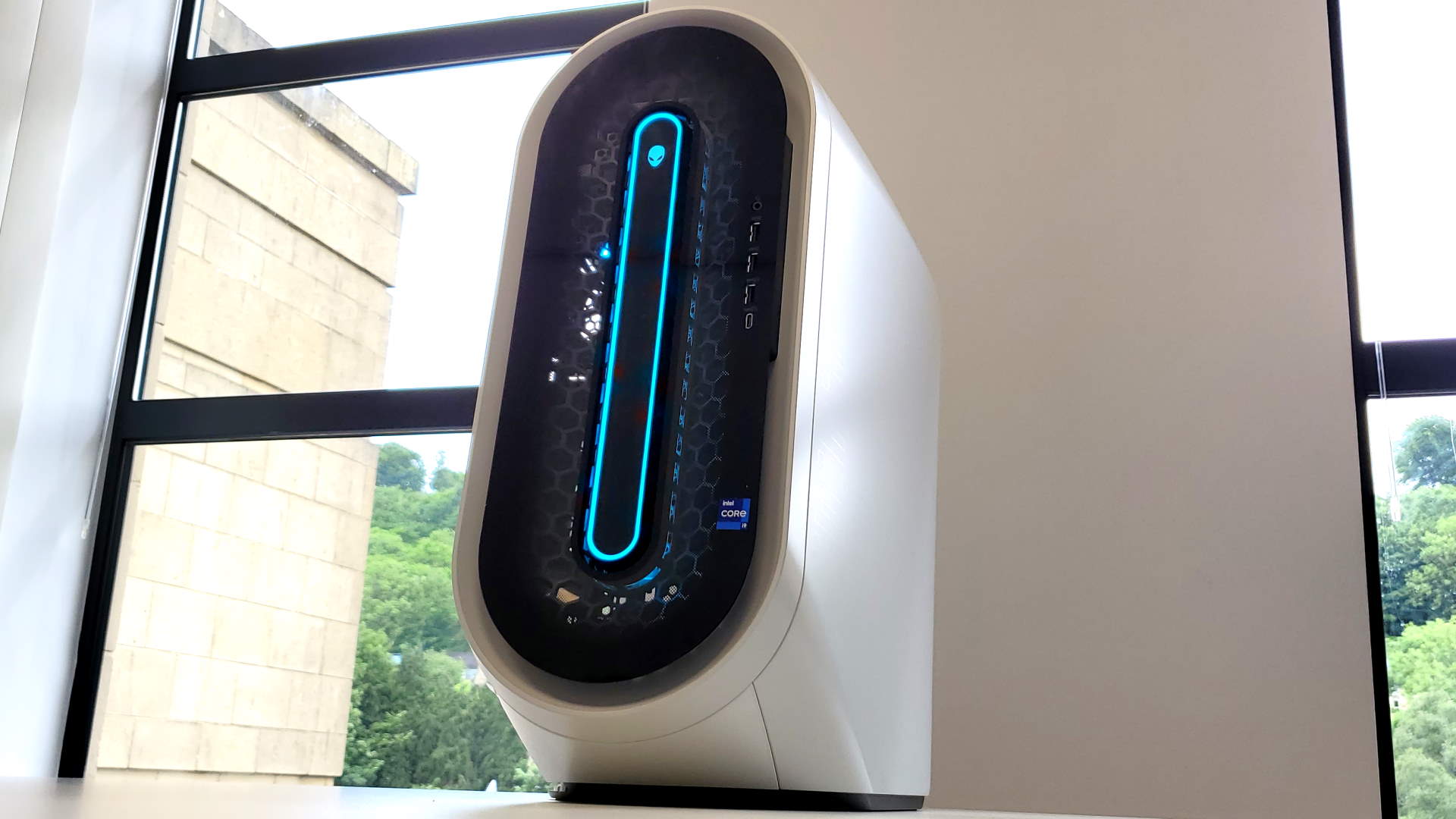
Though it also hints at an issue I have with the Aurora R13—and Alienware systems in general—from the point of view of a long-time PC gaming hardware nerd. And that's around the basic upgradeability of these partly bespoke machines.
With the non-standard motherboard you have the issue that once the platform it's based on is made effectively obsolete by far superior hardware you have no option to upgrade beyond buying a whole new rig. That's where a standard gaming PC will have your back. Just buy a new motherboard and chip, and away you go. Not something you can do with an Alienware rig.
What I will say, however, is that the motherboard platform itself is generally the last thing you want to upgrade, so while it does put a finite lifespan on the Aurora R13 as a whole, it's probably not that big a deal for the majority of PC gamers. Partly that's because the other parts of the system are so accessible. Upgrading your memory or adding a new SSD is a doddle because the slightly odd, bespoke motherboard design puts that all front and centre and makes them easy to get at. That's not something you'll always see on more standard ATX mobos.
The graphics card is standard dual-slot fare, too, and that's arguably the most important component a PC gamer will actually want to upgrade. The counter to that, however, is that if the trend for higher power GPUs continues your 750W PSU is going to lag behind at the very high end. And that, too, is of a bespoke design in the Aurora, which will make finding a replacement either tough or more expensive than it might be with a standard ATX design.
These are all issues you might have with the Corsair One, too, a gaming PC we can't help but love in its own right. That's a system which is throttling for a good reason—its diminutive scale—yet is also far too expensive to be a viable recommendation for most people. And try upgrading that in a couple years.
Which all makes the Aurora an interesting system to recommend. Pricing of all PC gaming hardware is in continual flux at the moment, but it's refreshing to see that Alienware isn't going quite so hard on the wallet as Corsair, or even the Omen machine we've tested it against. And, as I said earlier, the value judgement is not something that always tips in favour of the Aurora rigs.
Dell does have regular sales, however, which can bring its gaming systems into a more reasonable position. And for this sort of high-spec RTX 3080 system, the ~$3,400 sticker price is par for the course. Equivalent systems from OriginPC and Falcon Northwest will cost far more, and iBuyPower is around the same level.
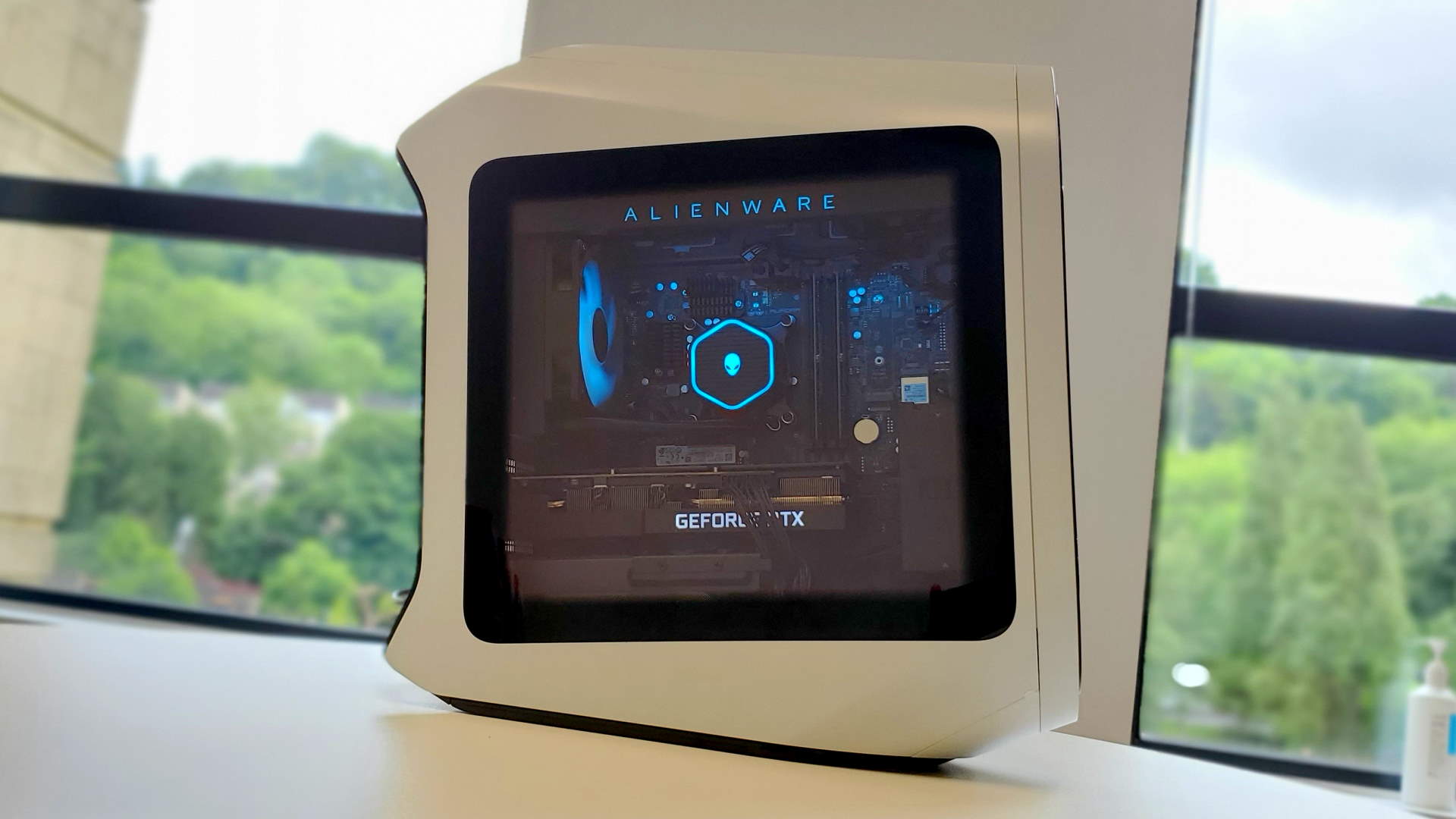
Which, as someone who would always build their own rigs, still kinda sucks.
Paying over three thousand dollars for a gaming PC does feel ludicrous to me, and that makes this specific spec I've been testing almost impossible to recommend. And when I've been talking about Alienware as a pure gaming PC brand there's zero point in picking a SKU with 64GB of DDR5 memory.
Almost any other RTX 3080-based Aurora R13 with a decent CPU would deliver essentially the same performance, and come with a far lower price tag. Dropping down to just 16GB DDR5 RAM will save you a huge amount of cash, and there's a far more tempting Aurora R13 system for $2,369 which uses the 12-core Alder Lake instead.
And because of my experience with this version of the R13 I'd happily recommend the cheaper build, much to the chagrin of other members of the PC Gamer hardware team. This exact spec? Nah.
But that's also because once more you can build a system yourself for less. Finally. That's something we've only just started seeing again in recent sales events, where prices are actually getting competitive on every part of PC gaming hardware for the first time in years.
Putting a machine together yourself is super-satisfying and in fact our own PC Gamer test rig out-performs any RTX 3080 pre-built gaming PC we've ever tested except at the top 4K resolution. I love building systems, and would recommend everyone should give it a go.
Well, everyone without my telephone number, that is, because there are certain people I know who should definitely buy a whole gaming PC instead and never take the side off. I don't wish to be their default 24/7 tech support hotline after all.
That's where a pre-built systems come into their own: aftersales care. Because that's who an Alienware machine is for. It's for the sort of gamer whose first instinct isn't to rip off the side panel at the slightest hint of a problem, and that's absolutely fine. I love the tech stuff, but I get it if you just want to play games and don't want to spend your precious you-time sticking a screwdriver into your PC. Again.
So yeah, if you're one of the few who would genuinely consider a motherboard and CPU replacement a likely upgrade down the line, then you'll want to steer clear of the Aurora R13 because of its bespoke limitations. But if you're looking at your new gaming PC as more akin to a console purchase—to last the lifetime of the base platform alone—then the Alienware Aurora's ease of use, simple base upgrades, and leading gaming performance, make it arguably one of the best gaming PCs out there. I just can't recommend you get this version, because the spec and price are way out.
The Alienware Aurora R13 isn't for everyone, and this 64GB spec probably isn't for anyone. If you're a dedicated PC tweaker looking for a new base system to upgrade down the line, you'd want to look elsewhere anyways. But if you just want a simple, good-looking PC that will tear through gaming frame rates out of the box, the Aurora R13 comes with far better-value specs lists than this.

Dave has been gaming since the days of Zaxxon and Lady Bug on the Colecovision, and code books for the Commodore Vic 20 (Death Race 2000!). He built his first gaming PC at the tender age of 16, and finally finished bug-fixing the Cyrix-based system around a year later. When he dropped it out of the window. He first started writing for Official PlayStation Magazine and Xbox World many decades ago, then moved onto PC Format full-time, then PC Gamer, TechRadar, and T3 among others. Now he's back, writing about the nightmarish graphics card market, CPUs with more cores than sense, gaming laptops hotter than the sun, and SSDs more capacious than a Cybertruck.
